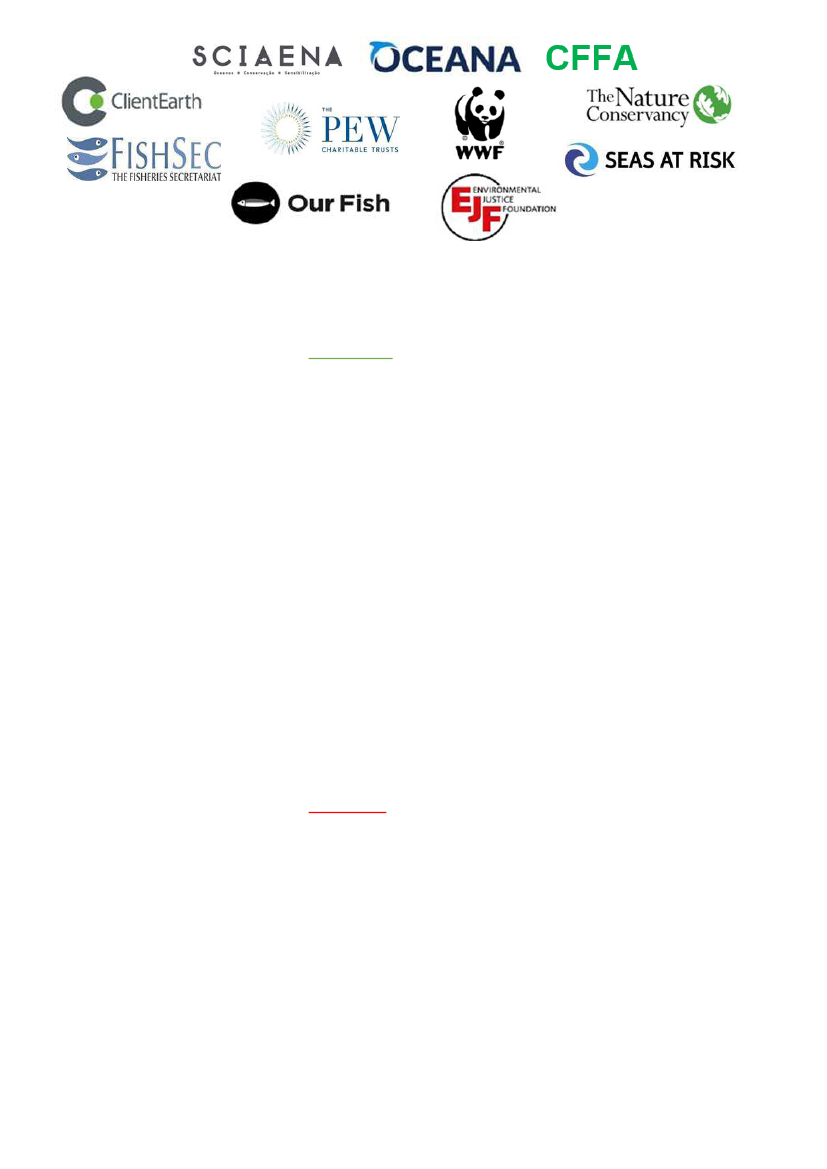Europaudvalget 2019-20
KOM (2018) 0368 Bilag 2
Offentligt
Joint NGO priorities on the revision of
the EU Fisheries Control System
November 2019
We call on decision-makers
to support
the Co
issio ’s proposal to:
Introduce Remote Electronic Monitoring (REM) requirements to enable fully documented
fisheries (Article 1(23) of the proposal);
Allow for a better implementation of the enforcement provisions of the Control Regulation (Article
1 (69), Annexes III and IV);
Mandate the use of tracking devices and electronic reporting of catches and fishing operations for
small-scale fishing vessels (Articles 1 (6), 1 (11) and 1 (12));
Improve the control of recreational fisheries by introducing licencing and reporting systems
(Article 1 (44));
Strengthen current traceability provisions to ensure the effective tracking of fishery products via
electronic traceability systems, covering both lots of EU and imported seafood along the supply
chain (Articles 1 (11), 1 (46), 1 (54) and 1 (56));
Require full documentation of all catches and discards (Article 1 (11));
Improve the control of fishing capacity, notably by mandating the continuous monitoring of
engine power for certain categories of vessels (Articles 1 (33) to 1 (37));
Enlarge the scope of the current provisions on the control of fishing restricted areas to cover all
essels a d a eas i the high seas a d i thi d ou t ies’ ate s A ti le 1
;
Replace the paper-based catch certificate scheme with an electronic scheme under the European
U io ’s Regulatio to p e e t, dete a d eli i ate illegal, u epo ted a d u egulated fishi g EU
IUU Regulation) (Article 4 (6)).
We call on decision-makers
to amend
the Co
issio ’s proposal to:
Mandate the use of REM on board of vessels and extend the possible use of REM to other
monitoring needs, such as gathering information on bycatch;
Introduce measures that would allow the effective control of technical measures, in particular
measures set out to minimise the impact of fishing activities on the marine environment;
Complete the list of serious infringements of the rules of the Common Fisheries Policy (CFP);
Provide a clear definition of traceability and include key data elements that are missing from the
EU IUU Regulation catch certificate;
Improve data management and sharing, including for data on catches, landings, vessel positions
and enforcement actions; and establish an EU Fisheries Control Data Centre;
Introduce transparency requirements by making information on the implementation of the
Control Regulation, such as audit reports, infringements and sanctions, publicly available;
St e gthe EFCA’s a date, i pa ti ula o e i g the i ple e tatio of the e te al
dimensions of the CFP; and ensure EFCA has the resources to fulfil this mandate.
kom (2018) 0368 - Bilag 2: Henvendelse af 4/6-20 fra Danmarks Naturfredningsforening, Greenpeace Danmark og Our Fish Danmark vedr. forhandlinger om revision af EU's kontrolforordning
1. Introduce mandatory Remote Electronic Monitoring requirements
Remote Electronic Monitoring (REM) is key to ensure fully documented fisheries. Indeed, data and
video footage using GPS, sensors and CCTV cameras enable the effective control and monitoring of
transparent and traceable fisheries. REM has already been introduced in some Member States (e.g.
Denmark, Spain and the U.K.); and the revision of the Control Regulation presents a unique
opportunity to establish it EU-wide.
We
recommend
to further expand the legal basis for the use of
REM in the EU or by EU vessels to ensure that it could also be consistently implemented by operators
for other purposes than the control and monitoring of the Landing Obligation (for example, to
improve bycatch management or data collection).
In addition, REM allows for the monitoring and control of the Landing Obligation. In this regard, it is
worth recalling that around 1.7 million tonnes of fish and marine life were discarded in EU fisheries
annually before 2011.
1
The reformed CFP introduced the Landing Obligation to eliminate this wasteful
practice of discarding unwanted catches. However, despite the serious environmental need and very
broad public support for this policy, the lack of effective monitoring and control at sea is leading to a
great degree of non-compliance including substandard catch reporting.
2
We therefore
support
the
Commission’s proposal to introduce Remote Electronic Monitoring (REM) to allow for the
monitoring and control of the
La di g O ligatio ’s effe ti e
implementation. In addition, we
recommend
increasing the monitoring capacity and powers of inspectors at sea to quantify the
amount of discards and gather clear evidence on compliance, or the lack thereof, with the Landing
Obligation.
2. Adapt the general control framework to the control of technical measures
The EU fishing fleet needs to apply all technical rules laid down in the Technical Measures Regulation.
3.
This applies, for example, to acoustic devices, streamers, spatial-temporal restrictions and gear
modifications, which have been introduced to minimise the impact of fisheries on the environment -
such as via accidental catches of marine mammals, marine reptiles and seabirds. Indeed, the survival
of several species including the critically endangered Balearic shearwater and the vulnerable
Loggerhead sea turtle depend on the strict implementation of fishing rules.
4
However, these rules have been widely disregarded and neither the current Control Regulation nor
the Co
issio ’s p oposal e su e that
they are sufficiently controlled and enforced. Indeed,
inspectors on vessels will not need to check if vessels are complying with EU rules relating to
minimising their impact on the marine environment. At the same time, no provisions are taken to
1
COM (2011). Commission Staff Working Paper Impact Assessment
accompanying the document
Commission proposal for
a Regulation of the European Parliament and of the Council on the Common Fisheries Policy.
2
COM (2019). Commission Staff Working Document
accompanying the document
Communication from the Commission to
the European parliament and the Council on the State of Play of the Common Fisheries Policy and Consulting on Fishing
Opportunities for 2020.
3
Regulation (EU) 2019/1241 of the European Parliament and of the Council of 20 June 2019 on the conservation of fisheries
resources and the protection of marine ecosystems through technical measures. For a list of the current legislation
applicable, as of June 2018, see: https://ec.europa.eu/fisheries/cfp/fishing_rules/technical_measures_en. In addition, see
also the proposal for a Regulation of the European Parliament and of the Council on the conservation of fishery resources
and the protection of marine ecosystems through technical measures, COM (2016) 134.
4
Cf. Directive 2009/147/EC of the European Parliament and of the Council on the conservation of wild birds and Council
Directive 92/43/EEC of 21 May 1992 on the conservation of natural habitats and of wild fauna and flora.
2
kom (2018) 0368 - Bilag 2: Henvendelse af 4/6-20 fra Danmarks Naturfredningsforening, Greenpeace Danmark og Our Fish Danmark vedr. forhandlinger om revision af EU's kontrolforordning
ensure that inspectors have sufficient training, capacity and resources to conduct these verifications.
Furthermore, the current legislation does not apply a fall-back option in emergency cases where
sanctions are not sufficient to stop destructive fishing practices - such as empowering the Commission
to close areas to some fisheries if a Member State does not respect its obligations to implement
technical measures for these fisheries.
Therefore, we
recommend
that:
The regulation specifically includes control and enforcement provisions for EU vessels on the
implementation of technical measures for conservation of fishery resources and the protection
of marine ecosystems;
The regulation explicitly states that inspectors shall be trained and well-resourced to ensure
that they can enforce the rules, including mitigation rules applied to fishing vessels to limit
accidental catches of sensitive species, placement of acoustic devices and streamers, as well as
testing the sink rate of weighted hooks;
A serious infringement is created to sanction licence holders and masters for not fulfilling the
obligations to mitigate against the accidental catches of sensitive species;
The Commission is empowered to prohibit fishing activities if technical rules have not been
implemented and sanctions have not been sufficient to stop destructive fishing.
3. Maintain and improve the EU legal framework for enforcement and sanctions
Even though the Control Regulation has been in place since 2010, there are very few Member States
that have issued effective and dissuasive sanctions. The number of sanctions imposed for
infringements is low and the level of these sanctions does not meet the criteria set in the Control and
IUU Regulations. Indeed, in 2017, the Commission itself recognised that
enforcement, especially
concerning sanctions and point system, follow up of infringements [...] are the areas that show the
iggest short o i gs
.
5
The continuous lack of political will from Member States to implement the
enforcement provisions of the Control and IUU Regulations, as well as the absence of concrete action
from the Commission to address this issue, are the roots of the problem.
The
Co
issio ’s
proposal moves the enforcement provisions of the IUU Regulation into the new
Control Regulation, opening the current sanctioning system to revision. This has been done without a
proper online public consultation, without a public impact assessment, and without a study on the
effectiveness of the current sanctioning system.
6
Moreover, it remains unclear how the Commission
and the Member States will address the existing implementation gaps of the enforcement provisions
of the IUU and Control Regulations.
In order to create a culture of compliance, it is key that the current provisions on the penalty point
system, serious infringements, immediate enforcement measures and accompanying sanctions are
further harmonised and strengthened, not weakened.
We therefore
support
these aspects of the
enforcement regime proposed by the Commission.
The proposal distinguishes between infringements that are serious by nature and other serious
infringements of the CFP, whose seriousness should be assessed according to a list of criteria set in
5
6
Commission Staff Working Document SWD (2017) 134 Final, p.18.
As e ui ed the Co
issio ’s o
Bette Regulatio Guideli es a d Tool o .
3
kom (2018) 0368 - Bilag 2: Henvendelse af 4/6-20 fra Danmarks Naturfredningsforening, Greenpeace Danmark og Our Fish Danmark vedr. forhandlinger om revision af EU's kontrolforordning
the Regulation. In addition, it proposes to use mandatory administrative sanctions in case of serious
infringements, for which it sets minimum levels of fines. The proposal further clarifies the rules
applicable within the penalty point system and makes explicit that any point assigned by the coastal
State must be enforced by the flag State.
In addition to these provisions, we
recommend
changing the list of serious infringements as follows:
Add
turning off Automatic Identification System (AIS) transmitters
to the list
–
if the AIS is
turned off for a legitimate reason such as the risk of piracy, the captain of a vessel should notify
the flag State and/or the coastal state;
Amend the
serious i fri ge e t “supplying
services to operators connected to a vessel engaged
in IUU fishing
to
benefitting from, supporting or engaging in IUU fishing including as
operators, effective beneficiaries, owners, logistics and service providers, including insurance
providers and other financial service providers ;
Add a serious infringement for licence holders and masters of fishing vessels who are not
fulfilling their obligations to mitigate against the accidental catches of sensitive species.
4. Mandate the use of cost-efficient tracking devices and the electronic
reporting of catches and fishing operations for small-scale vessels
Small-scale fisheries are critical in supporting the livelihoods of coastal communities and play an
important role in sustainable development, but they are not necessarily a synonym for low impact
fisheries. Therefore, their operations need to be properly assessed, monitored and controlled to
guarantee that their impacts are accurately accounted for, especially as 89% of the EU fleet
–
responsible for 25% of the
EU’s total seafood
catches
–
currently does not have a vessel monitoring
system on board.
7
In this context, the installation of tracking devices on board to automatically locate and identify small-
scale (under 12 meters) vessels is essential. Recent advances in technology have made these devices
small and cost-effective and they do not undermine the safe operation of the vessels and gears.
We
issio ’s proposal to e te d the use of
a vessel position data system to
therefore
support
the
Co
small-scale fishing activities.
Under current legislation, vessels below 10m are not required to record fishing logbook data or
complete a landing declaration indicating their catches. This poses a serious threat to the quality of
stock assessments, as smaller vessels are also responsible for catching significant quantities of fish,
and without the appropriate information on the amount of catches, it is not possible to achieve the
objectives of the CFP.
We therefore
support
the Co
issio ’s proposal to i trodu e a a urate
and complete electronic fishing logbook to record small-scale vessel operations, including details of
all catches by species, category, type and gear used.
5. Improve the control of recreational fisheries
Recreational fishing can bring conservation and socioeconomic benefits when it is properly regulated.
However, very few assessments have been undertaken on the socio-economic importance and
7
European Court of Auditors, Special Report No 08/2017 :
EU fisheries controls : more efforts needed,
p. 8.
4
kom (2018) 0368 - Bilag 2: Henvendelse af 4/6-20 fra Danmarks Naturfredningsforening, Greenpeace Danmark og Our Fish Danmark vedr. forhandlinger om revision af EU's kontrolforordning
environmental impact of recreational fishing activities
–
recent scientific studies have estimated that
marine recreational fishing represents between 2% and 72% of total catches, depending on the stock
and the region.
8
This is why
we
support
the Co
issio ’s proposal to i trodu e a registratio or
licencing system for recreational fishers and to collect data on their catches.
This licencing process
should not only monitor the number of persons involved in recreational fishing activities, but also
ensure that recreational fishers are well aware of the legislation in place, the species subject to a
recovery plan and the scientific rationale behind these.
Moreover, the obligation to report catches when stocks are subject to conservation measures is an
essential element to obtain greater accuracy on the status of fish stocks, as well as a clear
assessment of the share of catches from recreational fisheries in relation to commercial fishing.
Reporting of catches could be done in several different ways, but preference should be given to
electronic methods; this is particularly relevant for those recreational vessels fishing species subject
to a recovery plan. The fishing mortality data reported by recreational activities should then be taken
into account when estimating the quota allocation for the commercial sector.
In addition, we
recommend
that decision-makers ensure that the Control Regulation clearly
underlines that recreational catches require to be coherent with the multiannual and recovery
plans.
For this to be effective, some measures are required to control recreational mortality (e.g.
minimum landing sizes, fishing gear and catch limitations, or restricted areas and times). This should
take place in parallel with effective monitoring, control and surveillance schemes, which ensure that
Member States are regularly monitoring the catch effort of recreational fisheries and incorporate this
information in their fisheries resources management schemes.
6. Improve traceability requirements
Making fisheries products traceable from point-of-catch to final point-of-sale is a necessary pre-
condition to combatting illegal, unreported and unregulated (IUU) fishing, achieving sustainable
fisheries and healthy fish stocks, and safeguarding the livelihoods of fisheries-dependent communities
worldwide. This holds particularly true for the EU, which is the leading seafood market in the world
and imports over 60% of its seafood, mostly from developing countries.
However, while the EU food safety regulations ensure a degree of traceability for health, safety and
consumer purposes, they do not provide an adequate framework for ascertaining that products were
caught legally. Similarly, the Control Regulation has fallen short of adequately providing for this
framework.
We
support
the important steps taken by the Commission to rectify some of the traceability
loopholes in their proposal, including:
Mandating the electronic exchange of seafood traceability information along the supply chain
via electronic traceability systems;
8
Hyder, K., Radford, Z., Prellezo, R., Weltersbach, MS., Lewin, WC., Zarauz, L., Ferter, K., Ruiz, J., Twonhill, B., Mugerza, E.,
and Strehlow, HV., 2017, Research for PECH Committee,
Marine recreational and semi-subsistence fishing
–
Its value and its
impact on fish stocks,
European Parliament, Policy Department for Structural and Cohesion Policies, Brussels.
5
kom (2018) 0368 - Bilag 2: Henvendelse af 4/6-20 fra Danmarks Naturfredningsforening, Greenpeace Danmark og Our Fish Danmark vedr. forhandlinger om revision af EU's kontrolforordning
Mandating the tracking of lots of seafood along the supply chain through product
transformation, merging and transport, covering both EU-products as well as imported
products;
Ensuring that adequate information is passed along the supply chain to ascertain the legality of
EU-caught products.
Some key loopholes remain and we recommend that the following are addressed:
Providing a clear definition of traceability in the Regulation so that traceability requirements for
control purposes can be distinguished from labelling requirements for transparency to the
consumer;
Ensuring that sufficient information is also passed along the supply chain to ascertain the
legality of imported seafood products. This requires mandating the inclusion of key data
elements for traceability purposes in the catch certificate, as required under the EU IUU
Regulation, including the unique vessel identifier (IMO number) for all eligible vessels, the
catching method, better definition of catch areas with a clear distinction between the EEZ and
the high seas, and a link between catch areas and catch dates.
7. Improve data management and sharing
Many exceptions, gaps and discrepancies currently exist in the collection, sharing and reporting of EU
fisheries data, compromising the scientific information available for stock assessments and the
objective of achieving fully documented fisheries management as foreseen in Article 15 (1) of the
Common Fisheries Policy.
For example, current catches under 50 kg do not need to be recorded
–
an exemption that seriously
undermines the available fisheries information and reduces the controllability of adherence to the
Landing Obligation at sea. Indeed, the Scientific, Technical and Economic Committee for Fisheries
(STECF) has highlighted that the current scope of obligations needs to be expanded to improve
resolution in terms of catch reporting, inclusion of vessels not currently covered, and information at
an individual operational level, such as per haul.
9
In addition, the data reported by Member States to the Commission is often of poor quality. For
example, unexplained discrepancies exist between declared landings and the quantities recorded as
sold. Moreover, in a 2017 report, the European Court of Auditors found that Member States do not
sufficiently share and trace information concerning activities of EU-flagged vessels when fishing in the
waters of another Member State.
10
issio ’s proposal to ta kle so e of
these data deficiencies and discrepancies
We
support
the Co
by:
Removing the exemptions for vessels under 15 metres which allow them to not declare their
landings (vessels under 10 meters) and to provide their landing declarations on paper instead
of in electronic format (vessels between 10 and 15 meters);
9
Scientific, Technical and Economic Committee for Fisheries (STECF)
–
46th Plenary Meeting Report (PLEN-14-02). 2014.
Publications Office of the European Union, Luxembourg, EUR 26810 EN, JRC 91540, 117pp.
10
European Court of Auditors, Special Report No 08/2017 :
EU fisheries controls : more efforts needed,
p. 8.
6
kom (2018) 0368 - Bilag 2: Henvendelse af 4/6-20 fra Danmarks Naturfredningsforening, Greenpeace Danmark og Our Fish Danmark vedr. forhandlinger om revision af EU's kontrolforordning
Removing the exemption which allows vessels up to 15 meters to not have a Vessel Monitoring
System (VMS) on board;
Reducing the amount of catches that can be sold directly from vessels without a sales note
from 50 euros to 5 kg;
Requiring Member States to set up a system that allows the Commission as well as EFCA to
access fishing activity data and enforcement information (i.e. national register of
infringements) at all times and without prior notice, in a non-aggregated format;
Allowing scientific bodies of Member States to have access to vessel position data;
Establishing a direct electronic exchange system for Member States to exchange fisheries
information (i.e. vessel position data, electronic logbooks, landing declarations, sales notes
and inspection and surveillance reports);
Mandating the weighing of fishery products to take place on landing, on systems and by
operators approved by the competent authorities;
Requiring information on utilised conversion factors to be included in logbooks as well as
landing or transhipment declarations.
Another major problem identified is that the EFCA and the Commission do not have continuous and
sufficient access to fisheries data. The Commission receives relevant data from the Member States,
notably on catches, quota use, fishing effort and fishing fleet capacity, though it is not allowed to
analyse this information without an authorisation from the relevant Member State. EFCA, on the other
hand, receives information from Member States on the fleets engaged in the region covered by a Joint
Deployment Plan, but not on a structural basis. Despite these structural communication issues, the
Commission fails to propose the establishment of an EU-Fisheries Control Data Centre (FCDC), as
suggested by the European Court of Auditors, for an integrated European information system for
fisheries management. Indeed, the objective should be that data on fishing and enforcement activities
is available in near real time in a digital database that would allow direct electronic exchange between
Member States’ authorities and Commission services. EFCA should also have access to this database
for analysis and control purposes. In addition, non-EU countries should obtain access to parts of this
EU-wide database if a Sustainable Fisheries Partnership Agreement to which they are a contracting
party mandates this.
To strengthen the Commission’s proposal, we therefore
recommend
to:
Establish an EU Fisheries Control Data Centre or an EU-wide database accessible to Member
States, the Commission and EFCA;
Ensure that the Commission and/or EFCA has access to real time vessel position data;
Improve the standardisation of time intervals for communication of data, as well as other
relevant data fields, between Member States;
Grant access to relevant vessel position data from the EU-wide database to non-EU countries if
this is mandated by a Sustainable Fisheries Partnership Agreement to which they are a
contracting party;
Establish harmonised and EU-wide guidelines and systems that assist authorities in the cross-
checking of catch and landing data, including standardised conversion factors.
7
kom (2018) 0368 - Bilag 2: Henvendelse af 4/6-20 fra Danmarks Naturfredningsforening, Greenpeace Danmark og Our Fish Danmark vedr. forhandlinger om revision af EU's kontrolforordning
8. Ensure the monitoring and control of fleet capacity
Monitoring and control of fleet capacity is essential to ensure that national capacity ceilings laid out
in Annex II of the CFP are respected.
11
The ceilings found in Annex II are expressed in both gross
tonnage (GT) and kilowatts (kW). The current Control Regulation obliges Member States to control
these fishing capacity elements, though the system in place has proven to be ineffective. Indeed, in
its 2017 report, the European Court of Auditors noted that
the Me er States e isited did ot
sufficiently verify
the a ura y of their fleets’ apa ity a d of the i for atio o the essels i the fleet
register
;
12
and a recent Commission study found that the measured engine power exceeded the
certified engine power during 51% of the undertaken verifications.
13
We therefore
support
the Commission’s
proposals
to improve the control of fishing capacity,
notably by mandating the continuous monitoring of engine power on board vessels that use trawls,
seines and surrounding nets.
9. Effectively control fishing restricted areas and marine protected areas
In order to secure and restore favourable conservation status in marine sites affected by fishing
activities, including marine Natura 2000 areas, Article 11 of the CFP gives the right to propose
restrictions, such as spatial or temporal closures, to an
i itiati g Me e State
that has
a pote tial
fisheries
a age e t i te est i a
site. In addition, the different EU fisheries technical measures
regulations, as well as agreements made under Regional Fisheries Management Organisations
(RFMOs) subsequently transposed into EU legislation, set out certain area closures aimed at
biodiversity conservation. To control and monitor fishing activities in these restricted areas, the
current Control Regulation establishes that vessels of 12 mete
s’ le gth o
greater that enter into
these areas shall be controlled by Member States with a Vessel Monitoring System (VMS) that detects
and records their transit through the area. The frequency of data transmission shall be at least once
every 30 minutes when a fishing vessel enters a fishing-restricted area.
While we
support
the Commission’s proposal to extend the scope of Article 50 of the current Control
Regulation to all vessels - irrespective of their size - and to fishing areas located in the high seas or
in third countries’
aters,
we
recommend
to shorten the current 30-minute interval for the
frequency of data transmission in order to guarantee an effective protection of marine sites.
10.
Introduce transparency requirements
Transparency is essential to assess if the Control Regulation is to be effectively implemented across
the EU. Having access to up-to-date, public and reliable data on this topic will help to inform
consumers, civil society organisations and decision-makers, as well as foster a culture of trust and
compliance.
Regulation (EU) No 1380/2013 of the European Parliament and of the Council of 11 December 2013 on the Common
Fisheries Policy.
12
European Court of Auditors, Special Report No 08/2017: EU fisheries controls, more efforts needed, p. 7.
13
DG MARE, Final report on the study of engine power verification by Member States of 14 June 2019.
11
8
kom (2018) 0368 - Bilag 2: Henvendelse af 4/6-20 fra Danmarks Naturfredningsforening, Greenpeace Danmark og Our Fish Danmark vedr. forhandlinger om revision af EU's kontrolforordning
However, access to data on the implementation of the Control Regulation is difficult: Member States
only have to submit a report to the Commission every five years, in which they provide details on the
steps they have taken to implement the rules (including aggregated data on sanctions and penalty
points), but these reports are not public. This has not always been the case: before 2009 and the entry
into force of the current Control Regulation, the Commission reported regularly to the European
Parliament and to the Council, and the information contained in these annual communications was
public. Similarly, at the national level, data on infringements and sanctions are currently kept in non-
public national registers of infringements of the rules of the CFP that Member States are obliged to
maintain.
The Co
issio ’s p oposal i p o es the s ope a d ualit
of the data that has to be
recorded in the national registers of infringements, though it fails to remedy the lack of transparency.
We therefore
recommend
that:
Just as for the IUU Regulation, Member States report on the implementation of the Control
Regulation every two years, based on aggregated data from their national registers of
infringements. These reports should be
auto ati all pu lished o the Co
issio ’s e site.
In addition, we recommend that the Commission uses the information submitted by the
Member States to prepare bi-annual communications to the European Parliament and to the
Council on the implementation of the enforcement provisions of the Control Regulation;
Member States annually publish aggregated data on the number and types of inspections,
number of infringements detected and reported, and type of follow-up actions (simple
warnings, administrative sanctions, criminal sanctions, immediate enforcement measures, and
number of penalty points administered).
Moreover, the audit reports of the Member States’
o t ol s ste s a ied out
the Co
issio
under Title X of the current Control Regulation are not made public. In other areas of EU law, such as
in the area of food law, animal health and animal welfare, reports from audits in both Member States
a d thi d ou t ies a e a aila le o the Co
issio ’s e site.
14
We
recommend
that audits carried
out by the Commission of the control systems of Member States are made public on the
Co
issio ’s e site.
Lastly, Article 113 of the current Control Regulation contains provisions that severely undermine the
right of the public to have access to environmental information under the Aarhus Convention; and the
EU regulations implementing this Convention.
15
In particular, Article 113 gives Member States the
right to veto any decision taken by the European Commission to grant access to fisheries control data
to persons other than the competent control authorities of that Member State. This is in clear
contradiction of well-established jurisprudence from the European Court of Justice on access to
information matters, which says that Member States do not have the power to veto a decision from
the Commission to release their environmental data.
We therefore
recommend
that paragraphs 2
and 3 of Article 113 of the Control Regulation are either amended or deleted, in order to align the
fisheries control data transparency regime with the one set up under the Aarhus Convention on
14
15
See: http://ec.europa.eu/food/audits-analysis/audit_reports/index.cfm.
Convention of the United Nations Economic Commission for Europe (UNECE) of 25 June 1998 on access to information,
public participation in decision-making and access to justice in environmental matters (Aarhus Convention) and the
Regulation (EC) 1367/2006 of the European Parliament and of the Council of 6 September 2006 on the application of the
provisions of the Aarhus Convention on access to information, public participation in decision-making and access to justice
in environmental matters to Community institutions and bodies.
9
kom (2018) 0368 - Bilag 2: Henvendelse af 4/6-20 fra Danmarks Naturfredningsforening, Greenpeace Danmark og Our Fish Danmark vedr. forhandlinger om revision af EU's kontrolforordning
access to information, public participation in decision making and access to justice in environmental
matters.
11. Minimise the amendments to the EU IUU Regulation by staying within the
s ope of the Co
issio ’s proposal a d
stre gthe i g o l those
provisions opened for review
The EU IUU Regulation is the most progressive anti-IUU legislation of its kind globally. It is widely
recognised as one of the most important and effective tools in driving fisheries reforms worldwide
and improving fisheries governance in non-EU countries; it therefore contributes to global fish stock
health, food security, and the livelihoods of vulnerable coastal communities.
Regrettably, the Commission has taken the decision to propose changes to the IUU Regulation without
holding a proper consultation or carrying out an impact assessment on the subject. These changes are
limited to articles that deal with the catch certificate and sanctions for infringements, but the hasty
revision process poses a real and significant risk to the Regulation. It is therefore key that amendments
to the EU IUU Regulation strengthen this piece of legislation and do not weaken it.
We
support
the digitalisation of the catch certification system. Electronic catch certificates as well
as the introduction of an EU-wide IT system for their processing, as these will provide decisive means
to improve seafood import controls and verifications, harmonise these practices among Member
States and bring added transparency to supply chains in a cost, labour and time-effective manner.
We
recommend
the mandated use of the new IT tool. The Commission has already launched the
new IT tool (called CATCH), which is currently voluntary to use. The mandated use of the new IT tool
is required to ensure the effectiveness and success of the tool. As few Member States already have
systems in place to analyse catch certificates, the Commission should provide support to ensure the
interoperability of the IT system with existing national systems.
12.
Revise the European Fisheries Control Agency mandate
EFCA has an important role to play in the implementation of the external dimension of the CFP,
especially relating
to the IUU Regulatio . We ould the efo e suppo t the e isio of EFCA’s a date
in order to fully incorporate this international dimension into its activities. EFCA is also key to ensure
the effective implementation of the Control Regulation and its activities related to data analysis,
exchange and coordination between Member States should be expanded.
We call on decision-makers to ensure that EFCA is given the appropriate resources to fulfil its
mandate. In addition, we
recommend
that the follo i g a ti ities are i luded i EFCA’s a date:
A more defined and active role in dialogues with third countries on IUU fishing, by way of
increased and more steady support to DG MARE missions and an extended capacity-building
programme for third country officials;
An expansion
of EFCA’s role i resear h a d data a al sis arried out prior to issio s i third
countries, as well as data analysis for EU waters.
10
kom (2018) 0368 - Bilag 2: Henvendelse af 4/6-20 fra Danmarks Naturfredningsforening, Greenpeace Danmark og Our Fish Danmark vedr. forhandlinger om revision af EU's kontrolforordning
Contacts
Béatrice Gorez
Nick Goetschalckx
Georg Werner
Jan Isakson
Emily Langley
Marta Marrero Martin
Dana Miller
Vanya Vulperhorst
Rebecca Hubbard
Nikolas Evangelides
Gonçalo Carvalho
Andrea Ripol
Antonia Leroy
Katrin Poulsen
CFFA
ClientEarth
EJF
The Fisheries Secretariat
The Nature Conservancy
The Nature Conservancy
Oceana
Oceana
Our Fish
The Pew Charitable Trusts
Sciaena
Seas At Risk
WWF EPO
WWF EPO
cffa.cape@gmail.com
ngoetschalckx@clientearth.org
georg.werner@ejfoundation.org
jan.isakson@fishsec.org
emily.langley@tnc.org
marta.marreromartin@tnc.org
dmiller@oceana.org
vvulperhorst@oceana.org
rebecca@our.fish
nevangelides@pewtrusts.org
gcarvalho@sciaena.org
aripol@seas-at-risk.org
aleroy@wwf.eu
kpoulsen@wwf.eu
+32 2 652 5201
+32 2 2808 7021
+49 40 228 64 929
+46 70 608 74 83
+44 772 485 81 72
+32 468 38 54 48
+353 8385 44809
+32 2 513 2242
+34 657 669 425
+44 20 7535 4232
+351 936 257 281
+32 2 893 0968
+32 485 69 20 85
+32 484 494 557
11







